#armand answers
Note
do you think armand would be a coffee or a tea guy
NEITHER. He is a Dr Pepper fellow and he drinks at least 6 a day and Daniel is like erm boss why r u doing that and Armand is like QUIET BOY. I need my carbonated sugar
17 notes
·
View notes
Text
lmao danny is so angry about that ruse he's so unbelievably angry at being blindsided by that glorified role play he almost can't believe his anger. hiding underneath the bitterness of his words is barely distinguishable tremor at that very clear reminder at just how much power he holds communing with two predators that kill to live
"I mean hey whatever it is they're trying to hide I'm probably not gonna crack it which is, you know, who cares" said the man who's never cared more in his life and lashing out at real rashid? really??
#do u secretly wish u were in real rashids place danny#answer the question for science#srk line ate though I'll give him that 💀#even armand had to chuckle a bit#interview with the vampire#iwtv spoilers
167 notes
·
View notes
Note
i'm sorry if this is a bad question, but do you know anywhere online that i can read the vampire chronicles books for free? i don't want to ask my parents for money, i don't think they'd approve of me reading these types of books. i'm 19 but financially dependent on them for the foreseeable future so i don't wanna make them mad
hi! oh no, definitely not a bad question!
here's a link to a shared google folder that's been going around for a while with The Vampire Chronicles books 1-11, plus some other stuff like 'Interlude with the Undead' aka Armand's Playboy Story and 'Vittorio' (a standalone vampire novel that doesn't really have anything to do with the rest of TVC)
and here's a folder I just made that contains the PL-trilogy (so the last three books in the series)
they don't display by publication date in the drive, but the chronological reading order is as follows:
Interview with the Vampire (1976)
The Vampire Lestat (1985)
The Queen of the Damned (1988)
The Tale of the Body Thief (1992)
Memnoch the Devil (1995)
Pandora (1998)
The Vampire Armand (1998)
Merrick (2000)
Blood and Gold (2001)
Blackwood Farm (2002)
Blood Canticle (2003)
Prince Lestat (2014)
Prince Lestat and the Realms of Atlantis (2016)
Blood Communion: A Tale of Prince Lestat (2018)
a little bonus for the DM fans: I extracted the Devil's Minion's chapter from QotD a while ago to make your life and mine that much easier
enjoy, and welcome to our fandom if you decide to stick around! ♥️
#i get it i'm 28 and the price of books still makes me want to SOB and not everyone has access to a used bookstore but even then#you ask and hekate answers#vc#the vampire chronicles#lestat de lioncourt#louis de pointe du lac#armand#marius de romanus#daniel molloy#devil's minion#pdfs
436 notes
·
View notes
Text

Lestat iphone simulator
#loumandstat#important to note that louis and armand are probably in the same room at the moment#And Lestat meant to answer the first text right away to tell armand to fuck off#but he types slow as shit
253 notes
·
View notes
Note
I'm rewatching the episodes in French and Dathura hasn't made a reappearance has she? She just up and vanished.
Sorry to keep you waiting. First I had to take some screenshots and then my laptop's battery was always on the verge of giving out, so I couldn't just sit down and answer sooner.
But honestly, yeah! I actually wanted to point that out too!

Compared to the rest of the Brotherhood of the Forgotten, Dathura's disappearance is just plain weird. I watched an interview where Tot revealed that, unlike what the Kickstarter trailer might suggest, the demigods wouldn't really play a major role in season 4. And honestly, that's fair. Given the show is about the Brotherhood or the Tofu and, more importantly, they had just learned their purpose in life ended up being their being manipulated by a megalomaniac with daddy issues, realistically, I wouldn't want to have anything to do with action for a while either.
There's of course the fact that each of them asked to be sent to completely different locations and had very different goals. For example, Coqueline, Kali, and Sipho just wanted to pick up the pieces of what Oropo and especially Echo started and live as a family. And despite both of them ending up in Bonta, Ush wanted nothing to do with Black Bump.
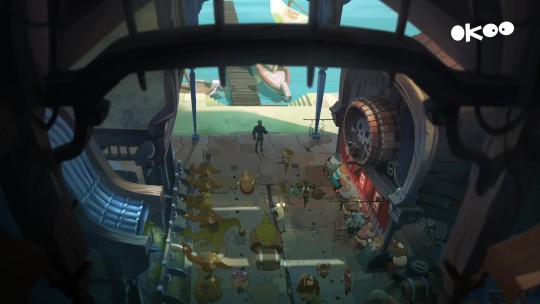

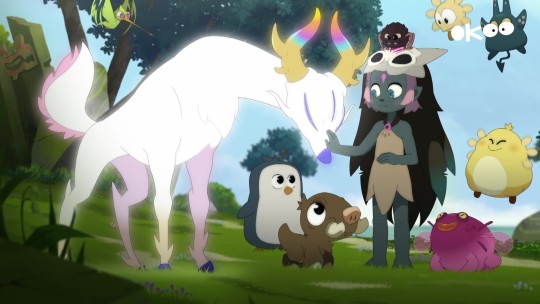
Which makes Dathura's disappearance from the main plot all that weirder. Because she is about the only demigoddes who has any business participating in the main plot by virtue of her actually being there.
Seriously, once again, the Sadida Kingdom is at the very centre of everything. They're the Nécromes main, or at least first, target. And yet, there is no sign of Dathura helping out as the powerful demigoddess she is despite her accepting Amalia's invitation to live in the kingdom and even going as far as remaining by her side the entirety of the third episode.
She was never even introduced to Armand and Aurora despite both of them being there when Amalia returned with her. Made all the more jarring by the fact that she remained by the princess' side even as she mourned her father's death and the next day (?) she just...vanishes with no explanation?

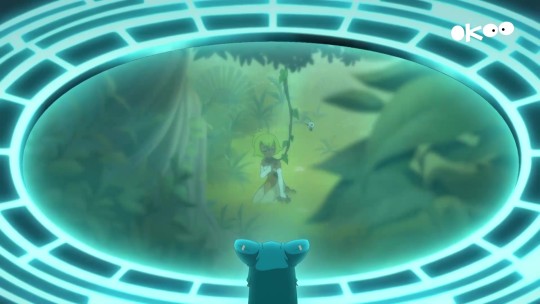
Seriously, out of all of the members of the Forgotten, the two with the most reason to have a bigger role in season 4 are Dathura and Ush. The former because she is supposed to be living there at the time of the Nécromes' attack, and the latter because he was the one who informed Joris of what was going on.
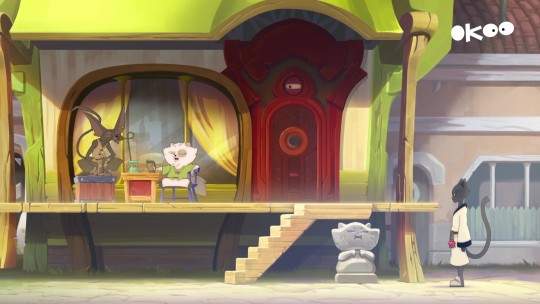
In Ush's case I can understand he decides to stay on the sidelines since he isn't exactly a hero, he mostly just does his own thing. But Dathura's disappearance can be very jarring.
What, did she awkwardly leave Amalia to mourn her father while she went to check in on Ogrest?
Oh, well. The season's been great so far and I don't really have any trouble with this. It's just weird, it's all.
#wakfu#wakfu spoilers#wakfu season 4#wakfu season 4 spoilers#the goddess of love#la dèese de l'amour#un nouveau monde#a new world#the brotherhood of the tofu#the brotherhood of the forgotten#wakfy analysis#dathura#sadida doll#divine doll#ush galesh#black bump#coqueline#kali#sipho#amalia sheran sharm#armand sheran sharm#aurora#oropo#lady echo#dofus#krosmoz#ask&answer#nécromes#yugo the eliatrope
65 notes
·
View notes
Text
Armand and the Romani
I’ve mentioned many times now that I think it would be really interesting and fitting if Armand in the show was Romani and that’s my personal interpretation of his character until proven otherwise. I don’t think it’s necessarily very likely going to be canon, especially when writers rarely remember Romani people exist, but like I’ve said this is like the only show in the world I think could be smart enough to understand how deeply the history of race and racism in Europe (which we know they’re going to address) is intertwined with the history of the Roma people, so you never know. I’ve seen an interesting theory that Armand could be a Tatar and I think that’s the most likely route they’re going to go, but I think him being Roma or some other ethnicity is still a possibility. Furthermore, because of the Roma people’s unique history he could actually be both Tatar and Roma at the same time, especially if he’s from Ukraine like in the books (more on this later). I wanted to elaborate on why Armand’s character and IWTV in general resonate with me so strongly, why I think Armand being Roma could bring a lot to the show and fit thematically, and how if Armand had a Roma background it would influence the way he acts.
Just as a foreword this post is long as HELL as I’ll be talking about Roma people with an assumption that most readers don’t know much about them, and it involves heavy generalization by necessity. I want to emphasize that Roma people are a very heterogeneous group that have very diverse experiences and practices depending on where they live, my experiences don’t apply to all Roma, and I’m not speaking for all Roma. I don’t know much about the Roma in France or Ukraine (which would be relevant for this conversation) other than what google can tell me and I don’t really trust it because much of the information you find on the internet is written by non-Roma people. So when I say something is a part of Roma culture, I mean really that it’s in my subjective experience a part of the traditional Roma culture in my country. The customs may vary a lot even between families in a same region, and the modern Roma and those with mixed ancestry (like me) don’t always follow traditions. I feel I need to stress this because there are a lot of (often negative) misconceptions of the Romani and I don’t want to further contribute to them or just replace them with different misconceptions. Content warning for discussion on sexual and racial violence and the Holocaust.


*
The history of the Roma people
The Romani (also called Roma, Rom and other variations) are a traditionally nomadic ethnic group originating from the northern India. The Roma are often confused with other itinerant people like Irish Travellers and the Yenish but are a separate group. Note also that the word ‘gypsy’ is considered pejorative and most Roma people dislike being called that, and the Roma have nothing to do with the country of Romania, the names are etymologically unrelated. The Roma people are divided in many different subgroups, and many facets of the Roma culture are easier to understand if you know that it was originally a clan culture like many nomadic cultures.
The Romani diaspora has spread to everywhere in the world (the biggest Roma populations are in U.S and Brazil) but is the most concentrated in Europe where they came through Persia in the Middle Ages, with most European countries today having a Roma minority of 0,5%-8%. The Roma population is estimated to be 10-15 million, but nobody knows for sure because many Roma aren’t included in censuses, many Roma people choose not to disclose their ethnicity due to discrimination, and some people who have Roma parentage don’t identify as Roma. The Roma identity is strongly tied to the community. A person who’s adopted or marries into a Roma family may in some cases be considered Roma regardless of their ethnic background, and an ethnically Roma person who doesn’t have connection to the Roma community and doesn't follow traditions might not be considered a real Roma (in practice the latter situation is much more common than the first one). This is relevant when talking about someone like Armand who if we follow the books was taken from his family when he was young and adopted by a white man. Regardless, the Roma are Europe’s largest ethnic minority. I don’t think statistics really matter in a fantasy horror show but it would be the most likely scenario for someone with Armand’s appearance who was born in the 1500s Europe to be Romani.
I assume the show Armand’s character and story may be largely similar to the books based on what we’ve seen, him just having been older when he was turned into a vampire, though it's unclear is he still from Ukraine. In the episode 2 we see him refer to his prayer in a language that Daniel thinks is ‘Kazakh, or 'somewhere in the Crimea’. Wikipedia suggest that it’s actually Uzbek, though we don't know does it mean Armand is definitely from Uzbekistan. Regardless, him using this language without even thinking when talking about his praying makes me think it may be his mother tongue, and we’re probably meant to think that he’s from the Eastern Europe/Central Asia region. I’m personally suspecting he could still be from the Ukraine region like in the books considering they had Daniel think of Crimea. Him using the name Armand Marius in France which is essentially a patronym also makes me think that he could be from a Slavic country. If he was Roma or from other nomadic tribe he could’ve also easily spent time in several countries. Although there is Romani language that is related to Sanskrit, most Roma speak as their native language whatever is the majority language where they live. Many Roma speak multiple languages, especially if they’re nomadic. From what we’ve seen of Armand speaking, Assad does a great job at making his accent vaguely sound like many different accents but not quite like any of them.
One of the ways the Roma are a unique group is that they’re one of the very few ethnicities in the whole world that don’t associate themselves with any country or place. Typically, even other nomadic peoples have some distant homeland or place they see themselves as connected to. The Roma don’t feel connection to any specific country or place; they have no homeland and they don’t want one either. Although in people’s perceptions the Roma are practically synonymous with free-spirited wanderers, most Roma in the modern time are sedentary, and historically when the Roma people have wandered it has often been because of persecution or trying to make a living, not by choice. Freedom and independence are important values for the Roma people, but more in the sense of being allowed to be themselves and live how they want, not necessarily physical roaming. It’s much more common for Roma people to dream of stability and having a home and secure job than of being able to wander.
Many of the perceived modern problems among the Roma can be traced to the change of work and industry from the late 1800s to the early 1900s. The industrialization and urbanization made most traditional Roma professions such as blacksmiths, craftsmen, horse traders, animal trainers and travelling salesmen and entertainers obsolete. Even though there was always prejudice against the Roma they also used to be respected for their expertise on those areas and there was positive interaction with the majority population too. Then suddenly they lost the chance to practice their old professions but lacked societal and monetary capital to learn new ones, which led to mass unemployment and poverty that still exists today. This not fitting in the modern society is a common Roma experience. In the books I feel this is reflected when the vampire characters seek ways to connect with the modern world and humanity. Armand sees Louis as such possibility, but as he in the end tells him ‘You are as cold and distant from me as those strange modern paintings of lines and hard forms that I cannot love or comprehend.’
The Roma people are defined by the dichotomy of being perpetual outsiders who never fully integrate anywhere, and on the other hand being chameleons who adapt anywhere. They often adopt the customs, language and religion of the majority population, while maintaining their own. The Roma have likely been in Europe for at least thousand years, and the earliest records of them are even older. Despite this the Roma have arguably never been fully a part of any wider society or fully accepted. It can be talked about the Roma society rather than just the Roma culture, because the Roma people often form almost a separate parallel society wherever they live. It’s common that the people from the main population don’t have any Roma friends while the Roma people don’t have any friends in the majority population, and the Roma may have little interaction and connection with the wider society. The Roma have been ostracized, but because of this long ostracization the Roma also don’t trust in the society around them and may try to limit their interactions with the majority population. As a Roma you can feel like you live behind a veil that separates you from the rest of the world and you can’t really touch and see each other. Many Roma experience the sense of profound loneliness and of rootlessness, a feeling like you don’t have the past or the future and nothing really matters. Everything above makes Rice’s melancholic, drifting, existential vampires very relatable to me.
The Roma people have been and still are associated with crime, dishonesty, uncleanness and supernatural. The Roma have often been accused of witchcraft, satanism and stealing children. Depending on the time and place people have tried to either banish or forcibly assimilate the Roma. In many countries it was legal to kill a Roma person without impunity. Historically The Roma have often been slaves or otherwise forced into labor or prevented from moving freely. For example, in Romania the Roma were kept in chattel slavery for centuries over 500 years until 1860. The first Roma in America arrived there as slaves too. Interesting in the context of the show, Spain sent Roma slaves to their Louisiana colony and at least according to Wikipedia there is an Afro-Romani community in St. Martin Parish due to intermarriage of African American and Romani slaves (I would’ve been interested to read more about this but couldn’t find much online sources). In the books Armand was abducted by the Tatars to be sold as a slave. Nowadays the term Tatar is used for different Turkic ethnic groups, but historically it was used to refer to anyone who came from the Northern or Central Asia (Tartary). The Roma people were also commonly known as Tartare/Tattare, as they came from the East too. Coincidentally some Roma are thought to have arrived in Europe as slaves of the Tatars or the Mongols. At the same time the Crimean Roma and the Crimean Tatars have a very close and unique history to the point that the Crimean Roma are commonly considered a subgroup of the Crimean Tatars. So it would actually be possible that Armand is both Tatar and Roma, especially if he comes from that region!
2. The Romani culture and relations with other people

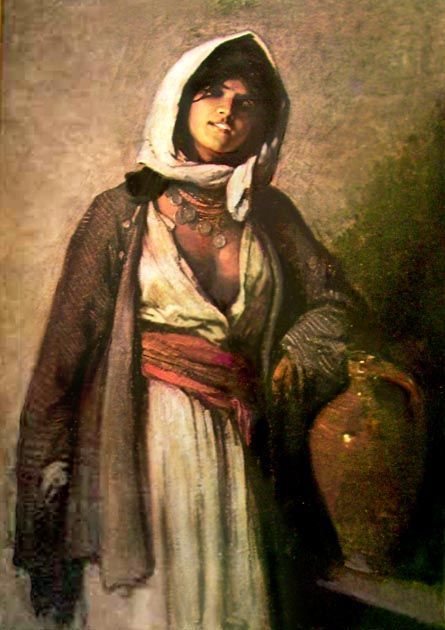
The Roma people are often highly fetishized and oversexualized, and viewed as promiscuous and manipulatively seductive, which can also be seen in how Roma characters are depicted in popular culture. Roma people continue to be victims of sexual assault and trafficking at very high rates. Roma women are often assumed to be prostitutes or sexually available. When you see news about human trafficking in the Eastern Europe, both labor and prostitution, the victims are often Roma even though it's rarely mentioned. Many consensual sex workers are also Roma, but most of them likely wouldn’t be sex workers without poverty and if they had other opportunities. Roma children experience sexual abuse much more frequently than children of the majority population, and they're often viewed as more mature and manipulative than they are. This all reminds me of how in the books Armand was sexualized by nearly every person he comes across even when he was a child or teen. Taking Roma children from their families to exploit them or to assimilate and ‘take the gypsy out of them’ in one way or another has always been common, nowadays this often happens in the guise of child protection. Here in Finland even 50% of the Romani children in 1950-1980 were placed in state care institutions, and this continues to happen in many countries. The less fantastical version of what Armand went through with being abducted and sold and exploited by everyone including his ‘savior’ who tried to sanctimoniously civilize him is what has happened to countless Roma children over the centuries.
The traditional Roma cultural practices can be considered (when heavily oversimplifying) to be built on three pillars that are connected to each other: respecting elders, concepts of purity and impurity, and honor and shame. Most cultures probably consider respecting old people important but in the Roma culture this is deeper and more extensive than usual. Older people are treated and spoken to with very high respect, people often address even their own parents with the formal ‘you’. Being older is on itself seen as a sign of authority and younger people must always listen to their elders. This respect shows up in everywhere in daily life in both practical and symbolic ways, older people take the food first, if the house has more than one floor the younger people don’t live in the rooms above older people, shaking hands with or sitting next to an older person may be considered inappropriate because they imply an equalitarian relationship etc. It’s very difficult for a young Roma person to say no to an older person or express anger or anything that could be seen as disrespectful. The Roma culture has anarchistic qualities because the Roma don’t necessarily acknowledge the state’s authority, and intracommunity hierarchies are quite fluid and decentralized, but the older people’s higher status over the young ones is seen as obvious and natural.
Cleanness is another aspect that is very central to the Roma culture, in both literal and symbolic sense (ironically, since the Roma are often seen as dirty). The Roma don’t expect non-Roma to follow or even be aware of their complex system around it (mentioning this because I know some people fear that they accidentally offend Roma if they do something wrong lol). The Roma consider the body above the waist ‘pure’ and below it ‘impure’, and things that touch them are kept separate, and all objects are categorized according to their perceived cleanness. For example, when you come from the grocery store the shopping bag can’t be put on the floor or chair, you can’t sit or lean on the table, hats and shirts are not put on chairs, if a kitchen utensil falls on the floor it may be thrown away instead of washed because it’s now considered unclean etc. Kitchen is the purest place and is kept as clean as humanly possible. The clothes of men and women and people of different age groups are washed separately. When a Roma person grows old they become ‘pure’, and people are particularly considerate not to tarnish them, for example a younger person can’t sit on an older person’s bed and if they sleep in the same room their feet can’t pointed at the older person’s direction. In some circumstances an impure person may be temporarily or permanently banished from the community. The importance of cleanness in the Roma culture goes back to preventing illness in the traditional nomadic lifestyle, and it’s speculated possibly to even further in history in India where the Roma people’s ancestors’, the lowest caste Dalits, responsibility may have been to handle corpses and other unsanitary jobs.
Contrary to the stereotype the Roma are usually highly modest and anything ‘below the navel’ stuff (sex, pregnancy, periods, bodily functions) is rarely discussed. The Roma men and women don’t talk about them at all with each other if they aren’t a couple, and parents don’t usually talk about sex or dating with their children. Casual sex is disapproved. Oral and anal sex are considered unclean. Although Roma people often marry very young (sometimes underage) it’s usually with people of the same age group, people of distinctly different generations having romantic or sexual relations or even talking about sex with each other is a taboo. For example, if there’s something sexual on television the younger people may leave out of respect if there are older people in the room. A pregnant woman may hide it even from her own parents. Much of the Roma customs focus on ‘keeping face’ and maintaining respectful relations with the other Roma and their surroundings and avoiding anything that would bring shame, and this shame can touch the whole family.
Now if we come back to Armand, if he’s a Roma that adds a new aspect to his trauma, especially pertaining to sexual abuse and his relationship with Marius. Sexual abuse and grooming like that are hard to for any child to process, and especially difficult and confusing it would be for a Roma child, when in the Roma culture older and younger people even talking about sex is seen as offensive and older people’s wisdom and authority are seen as absolute. When in the Roma culture sex itself is taboo and wrong kind of sexual activity can make you ritually unclean it would further worsen the trauma that started from his kidnapping and cause immense shame. Since the old people are considered purer than young people a Roma child might also feel like they’re soiling the sexual abuser and blame themself. Death and touching dead bodies is considered unclean as well; a vampire would always be ritually impure. The way Armand is exposed to sex in Venice is pretty much the polar opposite of how sex is treated in the Roma culture. In the books we see Armand struggle with his complicated feelings about Marius and how he resents him but can’t still stop loving him and seeking his approval, or often can’t even express his negative feelings openly. I think it sounds familiar how many Roma people want independence but still feel obligated to respect their elders even if doesn’t always feel right.
I think this respect for elders also shows in how Armand treats Daniel in the show. He’s quite polite towards him and very considerate in trying to make sure he’s comfortable. Although Armand is in his servant disguise for most of the season 1, he notably keeps talking to Daniel in a pretty similar way after he drops his disguise. This maintaining the appearance of respect even when you’re angry at the older person is typical for Roma people. Armand is chronologically much older than Daniel, but Daniel is still physically an elderly person which is seen as automatically deserving high respect in the Roma culture. Armand and Daniel possibly having some sort of romantic relationship in the past complicates their dynamic.
3. The Romani from the WWII to now
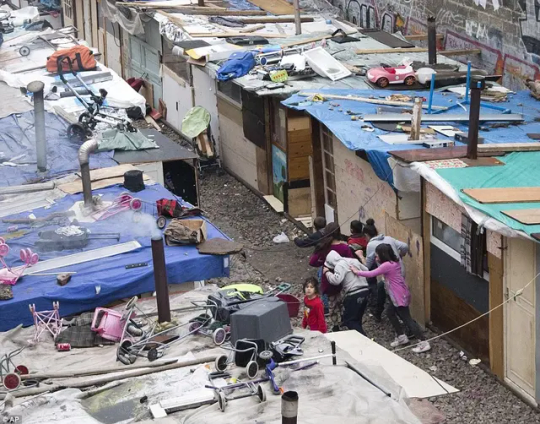
It's hard to convey how extreme the prejudice and hate towards the Roma people is still in the 2020s Europe. Majority of people have highly negative views on the Roma. In the polls most respondents say they don’t want to work with or employ Roma people and wouldn’t want their child to date anyone who’s Roma. Majority of the Roma live below the poverty line, often in segregated slums around cities or villages in countryside, many of them without electricity or running water or access to other basic services like healthcare. Depending on a country the life expectancy for Roma people is 7-20 years smaller than for the majority population. Housing for Roma people has been a big problem for a long time, with many Roma being homeless or living in subpar settlements that the officials often destroy and force Roma to move. Nobody wants to rent or sell to Roma people or be their neighbor, so the Roma population often segregated from the majority population. Illiteracy is still common. Many Roma children don’t go to school; if they do, they’re often put in special classes or special schools where they’re separated from other children and receive substandard education. If they receive proper education they can’t get a job because nobody will hire Roma people. Many companies and places refuse to let Roma people enter. Hate crimes and police violence are common. As a Roma you can feel like you’re leprous, nobody will talk to you or come close to you.
Typical for anti-Romani racism is that people don’t see it as real racism and consider it justified and something that Roma people deserve. There also isn’t much difference how left-wing and right-wing people view Roma. Racism against Roma people is widely accepted and normalized regardless of political affiliation. In Europe the Roma are singled out and many people who aren’t (at least on conscious level) racist towards other ethnicities still despise Roma people. A case that has stuck with me and I feel embodies how the Roma are dehumanized is from Naples, Italy in 2008 where the beachgoers continued their day sunbathing and picnicking near the bodies of two drowned Roma girls. Though anti-Roma racism exists everywhere, it’s where the European hypocrisy is its most obvious. The Europeans often talk about the history of racial segregation, slavery and ethnic cleansing in other places like it’s something distant and absurd to us, when systematic segregation continues to be everyday to Roma people here in the present day.
The position of the Roma people is unique because much of the discourse around racism in Europe is focused on immigration and assumptions that people of color always come from 'somewhere else', but the Roma’s ancestors have often been here as long as the white Europeans’ ancestors. Racism against the Roma people predates the modern concepts of race, scientific racism and the modern imperialism and colonialism. The Roma are a large group that certainly hasn’t been living in an isolated bubble separate from the rest of the world and they’ve had a significant influence on the Europe’s culture, but they and their suffering are often invisible and many people are completely ignorant of it. The Roma have oral tradition and there are few Roma politicians, journalists or scholars so they lack platform to make their issues known. The Roma have become a sort of permanent underclass in Europe.
We know that the s2 takes place in the 40s in the immediate aftermath of the WWII and deals with it in some capacity. The hatred towards the Roma people can be seen as having culminated during the WWII when anywhere from 250,000 to 2 million, or 25% to 80% of the European Roma were killed during the Holocaust. The figures vary so much because the Romani genocide is severely understudied, we don’t know how large the Roma population was, and there weren’t as meticulous records of the Roma victims as there was of the Jewish victims. The Romani genocide (sometimes called Porajmos) has often been treated as an afterthought but for the Roma people it was absolutely devastating. The Roma were classified as racially inferior and were killed in concentration camps and in shootings by mobile killing squads. Roma people were often sterilized and used for medical experiments. In some countries like Croatia and the Netherlands practically the entire Roma population was destroyed.
After the war there was little sympathy for the Roma. Many Roma became stateless refugees, and Germany didn’t acknowledge what happened to the Roma as genocide until decades later, which prevented the survivors from seeking restitution. The post-war trials didn’t cover the crimes against the Roma people. Attempts to assimilate the Roma and wipe out their culture continued in many countries. There still isn’t widespread acknowledgement and understanding of the Romani genocide and how it’s a direct cause for the Romani people’s current situation, even within the community. Deep poverty, illiteracy and lack of education and social institutions has led to there not being full consciousness and collective memory around the Holocaust among the Roma like the Jewish people have.
What happened to Roma varied a lot from country to country. France has always been rather hostile to the Roma, and it was also a ‘forerunner’ in the modern racial discrimination against them because it started to register Roma in the early 1900s and giving them ID cards that categorized them differently from other travelling workers. During the World War II some French Roma were deported to nazi-run concentration camps like Auschwitz, but most were detained in internment camps in France that were created under the nazi authorities but run by the French authorities. Although not technically extermination camps, their living conditions were similar to concentration camps and thousands of prisoners died from disease and hunger. After the German occupation ended the internment camps stayed in operation until 1946, two years after the liberation. The special Roma ID cards were used until the late 60s. Some people have noted how in the show Santiago seems to work as the ‘front’ for Theatre des Vampires while Armand stays in the background. I think it’s likely related to their races in any case, but this arrangement makes sense especially if Armand is Roma because it would be very diffcult for any company or organization to be openly led by a Roma person in France during the WWII, and the years preceding and following it. Even in the 2020s many people and companies refuse to do business with Roma people, and back then it would’ve been dangerous. Also, whether Armand is Roma or not, many people are probably going to assume he is when seeing a South Asian looking French man, so that’s going to be in subtext regardless.
I think all this would make Louis strongly sympathize with and relate to Armand – and also to see him as more vulnerable and less dangerous than he really is. However, Armand might not see the things in the same way. After Louis is turned he still feels on personal level engaged with what is happening in the society and feels anger over injustice and continues to see black people as his people even when he becomes increasingly distanced from the community. But when a Roma person is taken away from the Roma community they’re not necessarily perceived as Roma by other Roma or even themselves. You might never become a part of the wider society either, you just become ‘no one’. Armand might not think of Roma as ‘his people’. Because the Roma already see themselves as outcasts and separate from the rest of the world and people, for someone who becomes a vampire that could mean complete emotional disconnect.
Perhaps because the Roma perceive themselves as separate from the wider society, it’s not typical for Roma people to be interested in politics or activism or influencing the wider society at all. This is a big generalization because of course there are Roma activists and Roma organizations, especially since the 70s, but by and large Roma people tend to be more or less apathetic towards politics and analyzing the forces behind it. Many Roma don’t vote (and needless to say many countries make it difficult for them) or participate in politics in any way. Political movements, rebellions and revolutions mean nothing to the Roma people. Every so-called revolution or change either has had no influence on the Roma people’s life or made it worse. The Roma people don’t trust non-Roma people, and the organizations and movements have usually been uninterested in involving Roma people anyway. As someone who is interested in politics and activism when I try to talk about stuff with any other Roma person I often get a ‘why does this matter’ or ‘what does this have to do with us’ reaction. The Roma are very used to their situation because they can’t remember or imagine it ever being different, and they often have an attitude that could be described as ‘it is what it is’. Armand might not feel similar anger Louis feels. Armand’s indifference and distaste towards societal institutions is reflected in the books too:
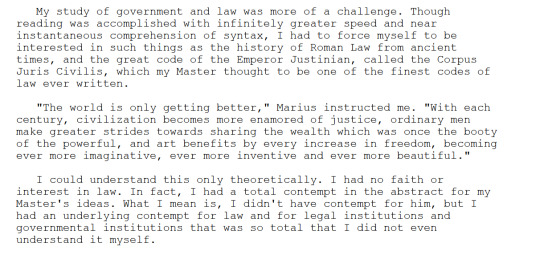
Armand would also perceive his own and Louis’ race differently than Louis does. For the Roma the world consists of people who are Roma or non-Roma (Gadjo). The Roma don’t really make differences between different races, they’re all Gadjo. When Armand meets Louis he would see him as a Gadjo man before black man, which I imagine could start to feel invalidating in the long term. The Roma tend to be sympathetic towards any outcasts and accepting of different people, but I think many Roma are also rather ignorant of different cultures and struggles, and they don’t necessarily feel automatic connection with different racialized people. The Roma perceive their experience as unique and something non-Roma people can’t understand. In the end all this means the way Armand views the world could actually be closer to how Lestat views it, and Louis might not find the solidarity and understanding he's hoping for.
4. The Romani family, kinship and spiritual practices
Religion and spirituality are very important to many Roma people. Here in Finland most Romani are deeply religious, much more so than the majority population that is pretty secular. Most Roma are Christians or Muslims, mostly different Christian sections in the Western Europe and Islam in the Balkans. The Roma in Ukraine are mostly Orthodox Christians or Muslims, so that would fit too if Armand was raised as a Muslim and didn’t convert later. Relationship with God, seeking forgiveness and sense of purpose, and someone who accepts you as you are, are something that Roma people commonly long for. The Hunchback of Notre Dame should never be used as an example of good representation and I swear this is the last time I’ll ever mention it anywhere, but I always thought this song captures surprisingly well something of how many Roma people feel. Armand’s intense and desperate relationship with religion and the spiritual struggle he and other characters go through is something that is very relatable to me.
With the lack of social structures, stability and purpose, for many Roma people the family and faith are the two most important things in the world. Without them the Roma have nothing. I think this is painfully clear with Armand who was separated from his family and culture, raised by a man who abused and then abandoned him, and literally lost his humanity and connection with God. Both other characters and Armand himself often describe him as this endless empty, hungry void that he is always trying to fill himself with something. Armand is prone to cult mentality and being manipulated in his intense yearning for emotional and spiritual connection.
I think Assad described Armand well when said he isn’t well-versed in the language of love and romance, but he does want it desperately. The Roma’s approach to romantic relationships is complicated because the strict rules of modesty around sexuality mean that they’re not usually explicitly discussed and even married couples avoid showing any affection in public. Historically Roma people have often been prevented from getting officially married so they have developed their own marriage rituals that vary by a country. Although the Roma take their relationship commitments very seriously legal marriage isn’t usually seen as important in the Roma culture and Roma couples may not get married at all legally.
The Roma are also one the very few cultures where in some countries like Finland the institution of marriage doesn’t really exist. The Romani here may get married sometimes but it’s seen as entirely unimportant and doesn’t have any bearing for the relationship, there usually isn’t a wedding or any rituals associated with marriage. A couple who’s committed to each other is seen as having the same status as a married couple. My paternal grandparents have been together for over 50 years and have never been married. Louis’ relationships with both Lestat and Armand would be considered marriage in the Roma culture. Because there aren’t well-established rules of dating and courtship in the Roma culture, forming romantic relationships can be difficult for Roma people. I’m thinking of Armand deeply wanting love but the way he approaches it often being awkward or offputting.
Family is the most important thing and the center of life in the Roma culture. The Romani culture is traditionally patriarchal and considering the importance of age, in practice the ‘leader’ is usually the oldest man of the family. The women’s position is complicated. Men and women are considered to be equals in the Roma culture and older women and their opinions are respected like with older men. Divorce is usually acceptable and isn’t seen as shameful, many older Roma women I know also have children with more than one man and it isn’t seen as a big deal. The ideal Roma woman is intelligent and emotionally and physically strong. At same time there have been and often still are distinctly divided roles for men and women in the Roma culture. Women are responsible for taking care of everything in the household and men for everything outside the household. The man of the house listens to their wife and children’s opinions but he has the final word. Men are expected to be the providers and protectors of their family and it’s something they base a lot of their identity and self-worth around – the most important thing really. I feel we can see a dynamic like this with Armand and Louis - Louis obviously isn’t a woman but he’s much weaker and younger (again, age being very important in the Roma culture). When watching s1 you think Armand is a servant, but if you look any closer, even without knowing it’s a performance, you notice what’s actually happening is that Armand is organizing and taking care of everything in their life. Later he tells Daniel how he’s protecting Louis like always with such a pride.
Another thing I think is worth mentioning that from my experience in the Roma culture physically disciplining children or women is and has been less acceptable and normalized than in the Western and many other cultures. It just isn’t done much, even my grandparents have said they don’t remember their own parents ever hitting them. This doesn’t mean that there isn’t domestic abuse in the Roma families, sadly it’s common in some regions, but it isn’t usually seen as normal and acceptable by the community. The Roma don’t like to involve police but there are many cases where an abusive man has been banished from the community. Also compared to many other cultures it can be less difficult for a woman to leave the man if she’s mistreated, since divorce is accepted and independence valued. I would say that when in most European countries there has often been an attitude that as a man you have a right and even responsibility to hit your wife and children, in the Roma culture it has been more like ‘a real man doesn’t do that’ and if they do they try to hide it. Roma men often perceive themselves as being more respectful towards women than Gadjo men are. When you combine all this - patriarchal society, older men having power over their family being seen as a normal and good thing, but disapproving overt violence within family – I think it would be very easy for Armand to convince himself he isn’t abusing or hurting Louis and is treating him right and being better than Lestat.
Art is very central to the Roma culture, especially music, dance and artisanship, but also other forms like painting and theatre. The first known records of the Roma people already refer to them being musicians. Travelling theatre companies like the one Lestat run away with when he was young were often formed by Roma people. Armand was a talented painter and his love and search for beauty is something that always remains in his story. I found it interesting that this s2 Claudia poster was seemingly inspired by Carmen, one of the most famous Roma characters, and maybe flamenco dancers in general (flamenco being developed in the Roma culture). It tells me that they seem to at least be aware that the Roma people exist if nothing else.
The Roma appreciate beauty and the finer things in life, sometimes in a way that can appear materialistic to the non-Roma people, but the Roma themselves don’t perceive it so. It’s not uncommon that the Roma who’re poor or even homeless still own some jewelry or a nice car. If the Roma people are actually rich they like to show it and are generous in sharing it. Wealth has often been unattainable to the Roma people, so if they have it they don’t see a reason to hide it. Historically the Roma also haven’t trusted banks so they prefer to keep their wealth in physical form. With Armand who grew up in poverty you can see how he appreciates luxury and likes to shower his loved ones like Daniel and Sybelle and Benjamin with it too (again, being a good provider is very important for the Roma men). Sidenote this is another reason why I think the Dubai house’s sterile minimalist interiors were not Armand’s idea because no Roma person in the world would ever decorate their house like that lol.
The way the Roma people traditionally dress differs from the majority population, and their appreciation for beauty and wealth is visible in it too. The clothing has been a way for Roma to show their identity to both other Roma and other people. The rules of modesty influence the Roma people’s traditional clothing and they often avoid showing knees and elbows and the shape of the body. Younger people often wear lighter and older people darker colors. Especially Roma women have dressed in very distinct ways depending on their tribe, for men it’s usually more subtle. The typical Roma men’s every day clothing includes suits, black or white dress shirts, loosely fitting black trousers, vests, hats, ruffles and golden jewelry. Armand’s styling in the show both in the flashbacks and Dubai caught my attention. While there’s nothing exclusively ‘Roma’ in his outfits almost all of them could easily be worn by a Roma man. Most likely it means nothing but knowing how good costume designer Carol Cutshall she would probably try to be accurate.
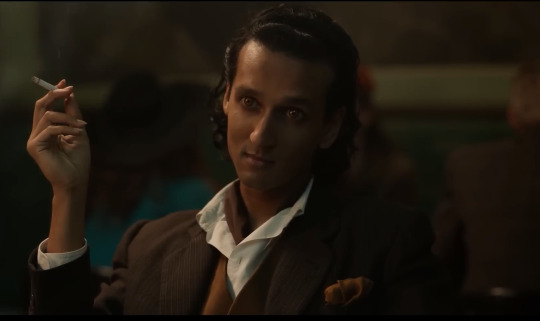
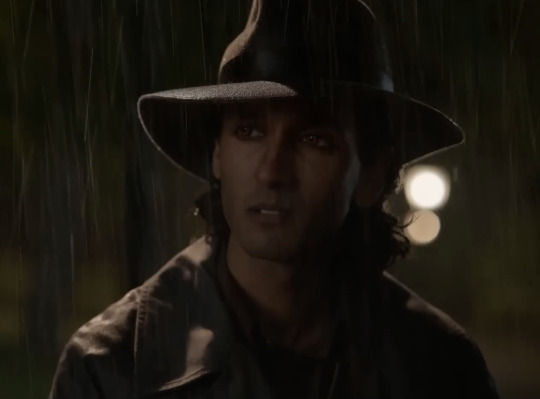
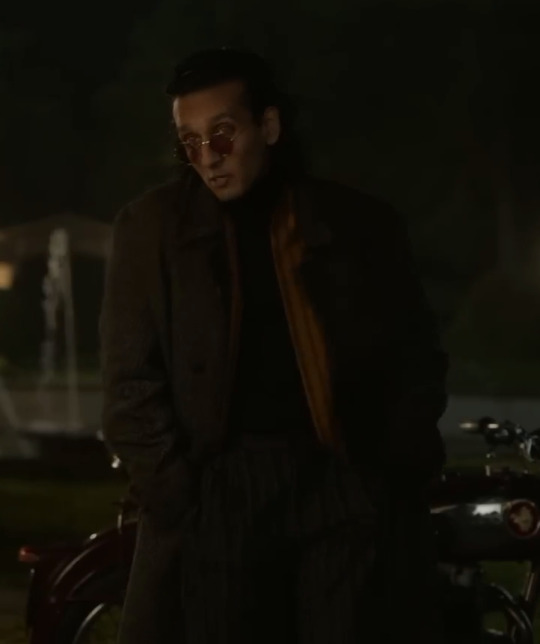

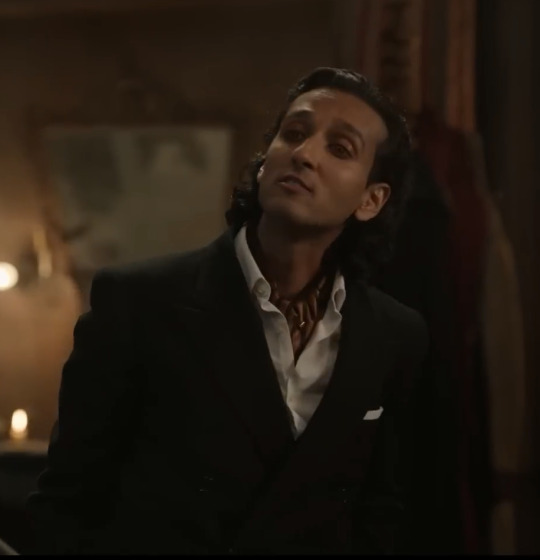

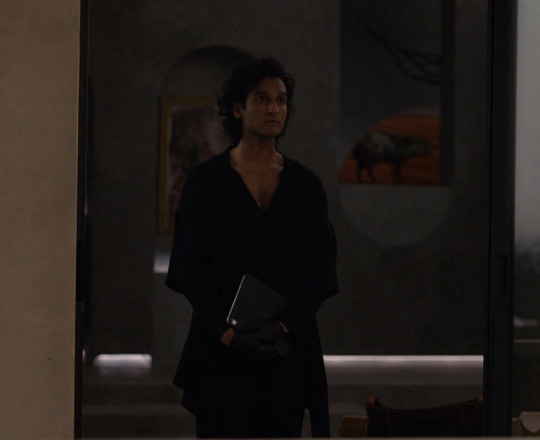
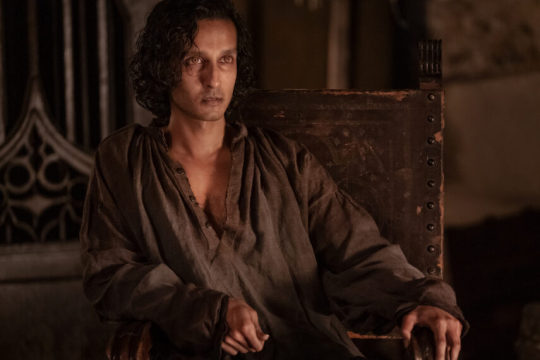
In the Roma culture referring to dead people by their name and showing their pictures is avoided. Traditionally the remaining family moves out from the house where they lived with the dead person, and the person’s belongings and images are burned or otherwise destroyed after their death (at least in Finland this is still sometimes done). It’s out of respect but I think it’s also a response to generations of trauma where there has been so much death and suffering that Roma people need to forget and move on so they can continue living. In the books Armand treats death in the same way; when he loses someone he stops talking about them, sometimes even thinking about them. When he’s abducted he doesn’t mention his father (who he assumes is dead) again and forgets even his own name, because the child he was before he was taken doesn’t exist anymore. Despite being so needy he often just leaves things behind and keeps on moving, like when he simply walked away from Louis. The Roma aren’t prone to nostalgia and they don’t like wallowing in the past or worrying about things that might or might not happen either, it’s all seen as a luxury they can't afford. It still doesn’t make it just disappear. The deep hidden sorrow that Armand and many other characters of the series always carry with them resonates with me as a Roma.
*
Lastly, I want to emphasize this is all just random theorizing and I’m happy regardless of whatever Armand’s background ends up being! I also know some Roma don’t want Roma portrayed in fiction made by non-Roma people at all because they don’t trust it to be done well. There’s also a problem with Roma characters usually being played by non-Roma. IWTV is an exception to me personally because I have an unusually high level of trust in this show’s writing, I love and relate to Armand’s character, and I think Assad Zaman looks like he could believably play a Roma man instead of the usual casting of a white person who looks ‘exotic’. However, like I said in the beginning there isn’t any proof Armand is actually going to be Roma and for now this is just headcanoning and speculation for fun. I also want to say that I hope I didn’t give an impression that Roma people’s life is like constant misery because that definitely isn’t true! There’s a tendency to see the Roma only through their problems when there are plenty of happy and successful Roma people and there has been improvement in the Roma people’s situation even though it’s slow. I also think one of the Roma people’s strengths has always been that they can find joy and humor even in hard circumstances.
If you got to this point I salute you thank you for reading!
#interview with the vampire#iwtv#i'm not joking how insanely long this post is if you still read or even just skimmed it through i'm kissing you on the mouth#i considered splitting it in two posts i hope it's even distantly coherent and not super boring#also if you have any questions i can try to answer lol#mal watches iwtv#iwtvposting#armand#.txt
94 notes
·
View notes
Note
So it really seems like Armand is Alice - or Daniel's lost memories of Armand have been conflated with his memories of Alice, or something. I'd be really interested to know your thoughts on how much Louis knows? We see malicious triumph from him but (I think) not really an awareness that this specific memory has heavy shades of Armand in it, more like he was happy to weaponise any terrible memory of Daniel's that came to hand.
But how could Louis not know? If Armand and Daniel were together in the past I bet Louis knew about it and probably still does?
(Also your Tumblr is amazing and fascinating and ILU)
Hello! I'm glad you like my Tumblr and thank you for the amazingly kind words! *hugs* 💕
So, Armand & Daniel and Louis. Now, my gut feeling at the moment is that Louis knows a lot about what happened between Armand and Daniel. But possibly not everything.
Or, more directly, I do think it's possible that Louis doesn't fully know how serious it really got between Armand and Daniel; that Armand and Daniel actually truly, deeply, and sincerely fell in love with each other. I may be wrong about that (as I've only had a chance to watch the episode once so far), but there are some little things that are making me think that for now.
The main reason is that we now have an answer for why Louis has called Daniel "our boy" before. (Which he hasn't done this season yet, but I'm sure it's coming.) IMO the reason was indirectly revealed in the scene when Real Rashid brought out the pictures . . . and what Louis and Armand both said about who some of the pictures were of: which is that they were pictures of young human men that were kept with Louis and Armand -- in their company -- for a period of time.
These two -- Louis and Armand -- would basically add a third into their relationship at one time or another. And that they did so a LOT more than once. And that it was something that was always initiated by Louis -- probably because it was something that was Louis' idea to do in the first place, back when they first did so with whomever the first young man they pulled in was.
We don't know how long these young men were kept with them, but I don't think it's wrong to guess that some were kept for rather long periods. It was Louis who would draw these young men into them . . . then some would be drained dry at some point if they weren't just let go.
And Daniel was basically set to be the next in the long line of young men that Louis and Armand would do this with. That is what was initially happening that night at Polynesian Mary's. With Louis, once again, being the one to draw the young man -- in this case, Daniel -- in.
But what made everything different this time -- and what made Daniel different from all the young men that had come before him wrt this -- was that first interview. And I think Assad hinted in an interview during the press tour as to why Armand steps in and saves Daniel's life when Louis attacks Daniel. And that reason is that during that interview, Daniel is able to understand and connect with Louis in a way that Armand hasn't been able to during all their years together. And so becomes fascinated by Daniel because of that.
And I don't think I'm guessing that Armand never became fascinated in such a way with any of the other young men that Louis lured into a triad with them. (Or, if Armand ever did, it was a very fleeting thing).
So, I think in this instance, the third that was lured in by Louis actually ended up fully capturing Armand's attention and, eventually, his heart. And while, as with all the other young men they had done this with before, Daniel was very much "our boy" for both him and Armand in Louis' eyes . . . there were deeper emotions that were growing between Armand and Daniel during that time that Louis just didn't really see -- or that maybe Armand kept Louis from seeing.
Because remember, Armand is much more skilled at the Mind Gift than Louis is. And Louis, very possibly, might have still been under the veil that -- in the books -- his mind gets clouded over by Armand after they first leave Paris.
So there are many reasons Louis may not have fully noticed everything that was happening between Armand and Daniel during however long Daniel was with them. (And, IMO, it is very much looking like it was at least 12 years, which was the length of the whole Devil's Minion saga -- before Daniel was finally turned -- in the book QotD).
Louis knows some things I feel sure of. Like, Louis knows Armand and Daniel had sex because . . . yeah. Armand and Louis weren't just pulling in young human men to be a third with them to play cards or something. 😏 But I'm not sure that Louis knows about the full emotional depth (and heartbreak) of everything that went down between Armand and Daniel.
So yeah, Louis knows about Armand & Daniel -- because he was the one to draw Daniel in to be a third with him and Armand in the first place. But I don't think Louis knows just how deeply and emotionally serious it really got between them. And maybe it's mostly because Armand just kept that part of it from Louis.
As to the Alice = Armand thing and if Louis knows that. . . again I'm not sure. It is one reason I kind of still sort of lean toward the idea that Alice is a real person, but many things about her have been merged with Armand in Daniel's mind. And Louis doesn't actually know which is which.
However . . . Louis could very well know how serious it got between Armand and Daniel, and that Alice isn't real and just really is Armand; and Louis just did what he did -- emotionally going in on Daniel like that -- because Louis really just wanted to hurt Daniel in that way because Daniel had hurt him in the same way just by asking about Lestat like that. Louis does have a very sadistic streak in him, I think that has been very well-established. And it would just be the simplest answer too for it all as well.
#Daniel Molloy#Armand#The Vampire Armand#Louis de Pointe du Lac#Devil's Minion#The Devil's Minion#Interview with the Vampire#amc Interview with the Vampire#amc iwtv#iwtv amc#iwtv#iwtv spoilers#iwtv Season 2 spoilers#ask#ask and answer#Daniel Malloy
52 notes
·
View notes
Note
How did you feel about Armand in this episode?
• he was horrible at playing rashid, lmao, he was essentially playing himself with shapewear. i rate his rashid performance 1/5. u also realize that louis in s1 was drawing upon armand in his own performance “to beat lestat you have to become lestat” to beat armand you have to become armand
• as ive been saying since the first season ended, i think people should pay a little mind to dubai + the emirates’s population makeup and the casting decisions here and what the show intends to covnvey in that. armand and rashid are both portrayed by south asian men, and the emirates is a petrostate with a majority population of south asians rendered slaves to maintain the status of a minority of wealthy expats. armand and louis, ur asking me abt armand so ima try to hush up are literal vampires, sucking the blood of their own. the moor of the underground catacombs, to the theater master in paris, to the vampire with diplomatic immunity in dubai, so excited to see how his story arc unfolds… assad said he too had to play multiple forms of armand& was excited about showing us that.
• as assad has said in multiple interviews, and armand himself in his poor guise in s1e5 voices, armand emphasizes just how much does not want this interview to occur. we start out in dubai with armand, louis, and daniel as three distinct entities with their own motivations, seated separately from eachother in different clothing (white, black, gray). i mistakenly thought that this would be a later season thing, but showing this early on shows each character’s motivations here really well. armand in dubai recognizes daniel as a threat to the status quo hes developed with louis, and is drumming up all kinds of ways to break daniel just as daniel wants to break thru this story… very interesting.
• isnt it so fucked up that in the bedroom armand tells louis “he [daniel] wants you in pieces for the privilege of putting you back together as he sees fit” while louis has to ask him permission to see the pieces of claudia’s private accounts that he pieced up and put back as he saw fit to preserve the integrity of louis’s self after he killed claudia in such a manner? projection, thy name is armand.
• armand in the end of the episode deciding to draw upon 150 years of prior work experience to put on a ploy to further unsettle daniel… we’ve been together 77 years, let the math of that settle in, and then we see them walk in the next day in matching outfits holding hands. a stark contrast to the earlier scenes and really so fucking funny
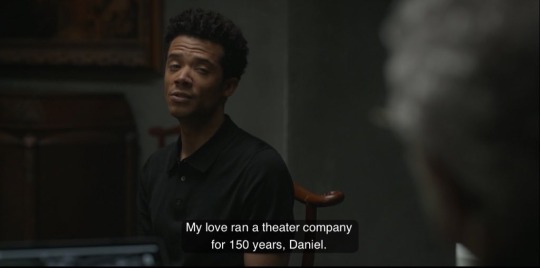

hope this answers what ur asking!
35 notes
·
View notes
Text
wait a second wait a SECOND.
idk if anybody else has said this yet but. the implications of daniel wondering what rashid armand’s blood tastes like??? considering he was addicted to it in the books????
and louis says honey and pineapple? and daniel asks for a refill? holy shit
what are they doing to me what tge fuck wait a second.
#im sorry i space my paragraphs out so much#i just think it makes me slightly more coherent#interview with the vampire#iwtv#lestat de lioncourt#louis de pointe du lac#louistat#loustat#rashid#sam reid#jacob anderson#daniel molloy#devil’s minion#danielarmand#armand#armand daniel#do you think he lays awake at night#pondering that answer?#do you think he can still#taste the sweetness of it#on his tongue?#do you think he craves it like the#air he breathes?
573 notes
·
View notes
Note
“Something raw and tender in the way Armand looked, all composure stripped away”, description of all time of Armand from Daniel me thinks. He really got to see HIM man 🤧 for exactly who he was 🤧 it will never not make me lose it!
RIGHT?? YES. It's so powerful.
The thing about Armand is he's so good at keeping his walls up. He's so full of trauma and pain that he tends to keep his expressions blank or metered, he tries to hold his feelings in. I guess we can even call it masking to some degree (or maybe to the 10th degree, your mileage may vary there). The point is, he doesn't let people see beyond what he wants them to see most of the time.
But sometimes he loses it (Lestat describes this as Armand's face changing and twisting around).
And sometimes he lets his guard down, like here. He's just open and raw and Daniel can see all of his pain. The masks are down, the guards are down, Armand is openly himself. He's been worried for Daniel, terrified probably, and with all of the burnings and stuff going on he has no idea what else might be lost. And now here he is in a car with Daniel, who's dying and whom he's going to make a vampire, which then might kill him anyway because of what's happening... He's overwhelmed and he abandons all pretense. He's scared and he shows it and then he chastises Daniel for running in a way that's made it hard to follow and find him at all:
A strange light in the eye, what was it? Something raw and tender in the way Armand looked, all the composure stripped away. He lifted a tumbler half full of brandy and put it in Daniel's hand.
"And you running from me," he said, "from Stockholm and Edinburgh and Paris. What do you think I am that I can follow you at such speed down so many pathways? And such danger-"
Lips against Daniel's face, suddenly, ah, that's better, I like kissing. And snuggling with dead things, yes, hold me.
And then Armand kisses him and tries to explain what's happening, and his fear is evident. Not just the fear of dying himself or losing the other immortals he knows and loves, but the fear of losing Daniel.
It's so poignant and so sweet, and I love that Daniel is someone Armand feels comfortable dropping the walls for.
Thank you for the message anon!!! I could talk about these two fools all day (and do, much the chagrin of others, I'm sure.)
#armand/daniel#devil's minion#vc meta#queen of the damned#vc quotes#armand#daniel molloy#armand x daniel#vc#vampire chronicles#the devil's minion#devils minion#tvc#answers in the desert#anonymous#anne went hard when she wrote this chapter#and then probably spent her years wondering why people are so invested in these two hahaha
49 notes
·
View notes
Note
⏳
IS THAT A PREHISTORIC CAVEMAN OOGMAND REFERENCE FROM HIT SERVER THAT I WILL NOT BE NAMING 😦😦😦😦😦😦
3 notes
·
View notes
Note
🚨 what do you think is the best and worst thing Armand ever did?
Oh anon strap in, this is gonna get heavy.
Disclaimer: this is my personal read, my own meta, everyone else is entitled to their own takes etc etc
We're gonna start with the worst: everything he did with Louis in iwtv.
Let me explain.
Something that is very common for survivors of trauma that was more psychological in nature and required betraying oneself in order to stay safe is to enter the fawn response. Aka people pleasing. Someone who has learned that they have to pretend to be someone else in order to keep others around them happy and keep themselves safe doesn't just shake that when the threat has ended. They then go on to feel as if they must do that in all future relationships in order to be loved and cared for, and if this goes unchecked then it can manifest into some really damaging behavior.
Things like lying about personal beliefs in order to tell the desired companion what the traumatized person thinks they want to hear, trying to control outcomes of certain situations in order for things to happen that they think will keep the desired companion with them. Someone who is people pleasing ends up saying "Yes I love the thing that you love" to one person, while saying deep down (or to another person) "I actually hate this thing so much".
And while it's understandable why someone who is people pleasing believes they have to act that way, it leads to their companion feeling manipulated when they find out that all the things that were said and done to 'please' them were untrue or done simply to control the situation and keep them around.
(And if it gets really out of control, subconscious behavior can become conscious acts of manipulation)
So with Louis we meet an Armand who says that he cares nothing for god, that if he met a mortal who inspired a lust for life in him once again he would turn that mortal immediately, that he would have turned Madeline himself. As readers we find out this isn't true later, that Armand struggles with his faith, that Armand would rather suffer anything than turn someone else into a vampire. But if we look at his words from a perspective of someone in a fawn response, he's saying those things because he believes that's what Louis needs to hear in order to accept his love and love him back.
And in more overt ways he forces Louis' hand with Madeline by using his influence, because Armand has decided it would be 'good' for Louis to turn her, that this will help him accept the loss of Claudia and come be with him. It's an act of controlling the situation to try to control for Armand's desired outcome (Louis loves me and will leave Claudia behind for me) but he's doing it under the people pleasing lie of 'this is what Louis needs, this is what will make him happy' when really it's about what will make Armand happy and safe. In that act subconscious fawning has become conscious manipulation.
While Armand's emotional detachment and lack of reaction to the burning of the theater and death of Denis is in many ways related to his self-admitted inability to feel anything at that time, there's also an aspect of fawning there: in order to people please one cannot offer their real feelings for fear of upsetting the companion. So really it just leads this situation where Louis doesn't know how Armand really feels about anything. He never shows Louis a moment of hurt or anger or outage, which we readers know he is capable of, because in order to feel safe and continue to 'please' he cannot let himself feel anything at all except that which his companion feels.
And that's why their relationship crumbles, because Louis is right: they cannot offer each other real love because Louis is mired in grief and Armand is incapable of being fully honest. He can't cultivate a true sense of self and show Louis that self because he's too swept in fawning for him and 'pleasing' him. Even when he and Louis break up he doesn't show his hurt, doesn't articulate having felt neglected. He just walks away, holds it all in, and fawns away his own feelings.
So that's why I think the best thing he did was that moment of sincerity with Daniel right before he turned him: admitting that he felt like a coward, and that he loved Daniel far too much to let him die.
In his explorations with Daniel Armand stops pleasing and swings to far other end of the spectrum for a time: he is so utterly absorbed in exploring the world and figuring out who he is and how he fits in that at times he doesn't consider Daniel's feelings much at all. But by the end of things when the running begins, he doesn't chase Daniel until Daniel calls for him. He becomes honest about his feelings and desires, despite the layers of shame he's heaped upon them. He stops detaching and fawning and gets real.
Which in the end is the key to him re-uniting with Louis and building a healthier relationship, creating his own home, opening the door to future reconciliation with Marius and having Daniel move back in with him. Armand had to learn to be himself fearlessly so that he would have genuine love to give.
#pls i am not an armand/louis hater at all don't take it that way lmao#and i don't believe his relationship with daniel was 100% healthy either#it's just that he hits rock bottom on both ends of the spectrum with excessive fawning and excessive selfishness#before he can find his way to a middle ground and honesty#and that's growth baby!!!#i think this is why in the vampire companion anne said armand was a good person with daniel#because by daniel's turning he's learned to stop chasing and manipulating and fawning and be genuine instead#and trinity gate couldn't exist if that arc never happened#apoptoses answers#vc meta
50 notes
·
View notes
Note
the fact that armand got called a gross vile nasty little insect not once but twice by two different people at two different points in time is wild to me
POV: you're Lestat and Daniel getting a fear boner in the presence of this magnificent creature
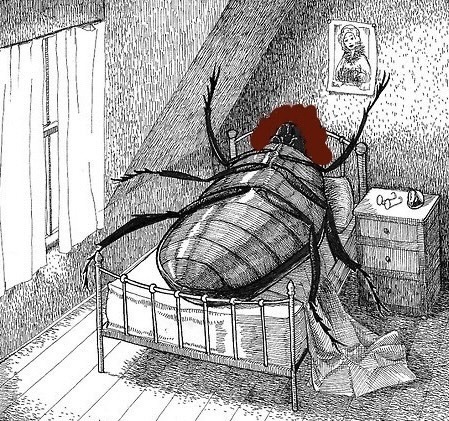
#lestat 🤝 daniel: calling my boy an insect approximately 200 years apart#you ask and hekate answers#armand#lestat de lioncourt#daniel molloy#vc
66 notes
·
View notes
Text
can’t stop thinking about louis only wearing black coloured outfits in the present timeline (even his pyjamas are black). at first I thought it was some kind of dress code in the dubai tower or he and armand decided colour coordinate but we’ve seen armand wearing bright colours for different occasions now. so why louis who always liked to play with colour (even when he met daniel for the first time and claudia was already 🔪🔪 he wore that bright jean jacket) seemingly avoids it?? is that a fashion statement??? is he too depressed to care about his looks?? wtf is going on?????
#i need answers#and I know that everything is done on purpose in this show so I’m seated#interview with the vampire#iwtv#amc iwtv#louis de pointe du lac#the vampire armand#text post#iwtv s2
35 notes
·
View notes
Text
Thinking about the implications of the shift from season one having each episode structured around a single interview session, to the premiere episode of the second season containing two partial sessions and reference to another that happened off screen. Previously, almost every scene in the show occurred between the moments Daniel prepared to conduct the interview and the conversation immediately following the end of a recording. Each of these sessions focused on an identifiable chapter of Louis’ life, the delineation between which was further emphasised by the subtle changes to Louis’ framing and approach. As Louis begins to question his recollection and interpretation of events however, so those neat boundaries have started to erode. Now, recollections of his and Claudia’s search for old world vampires spill over three sessions, one of which the audience is only aware of due to Daniel making an impatient remark about how meandering it was (“And I want to thank you, Louis, for yesterday’s eight hours on how to avoid the sun and torpedoes while cruising the Mediterranean war theatre.”). The effect of the conversations and passages of time between sessions meanwhile has been brought to the forefront, positioning it as, if not more, important than what is being discussed during the interview itself. This more organic and uncurated structure seems to be a tentative promise that Louis may be able to find something in his recollections that will allow him to grow, but also serves as an ominous warning of the danger that these memories pose for Louis.
#it seems likely that the next episode will deliberately return to a more familiar format#but despite the attempts of Armand and often Louis#it will never quite settle again#it will be interrupted by Daniel's need for answers about 1973#potentially Armand will be pushed by Daniel's crowing to say more about his history with Lestat than he told Louis during that time period#it will be really interesting to see how Louis and Armand operate as co-narrators#then there is Daniel's fuelled interest in how the penthouse operates#and the promise of Daniel speaking to people outside of it#Louis de Pointe du Lac#Daniel Molloy#Interview with the Vampire
35 notes
·
View notes
Text

GUESS WHAT well yes indeed it's that guy again. but at this point he probably hasn't even killed anyone yet 🥺
amadeo recons the sun could hurry and set already
(for ✨resolution✨ enjoyers: bigger size picture is on twitter)
#the vampire armand#who else#iwtv#iwtv fanart#amc iwtv#assad zaman#his sunset photos on instagram were an inspiration.....#am i experiencing a hyperfixation#we know the answer#and it's yes#the answer is yes#i am hyperfixating#OH BUT LOOK IT HAS A BACKGROUND!!!!!#the vampire chronicles#vampire chronicles fanart#amadeo#and ughghh marius*😒😑🙄🥱 (*implied)
344 notes
·
View notes